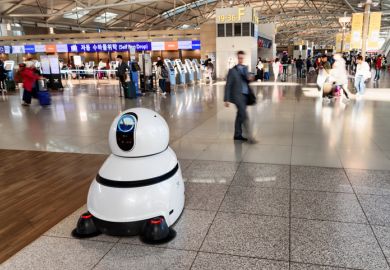The IT profession and the academic subject of computer science are maturing. But a reminder of just how discourteous intelligent IT people can be is given in Computers and People. W. Neville Holmes recalls a spat generated by an innocent speculation in his regular column "The Profession", published in the journal Computer . He had hazarded a hypothesis about the origin of the term "floppy disk" that drew this barb from Eric S. Raymond, author of The New Hacker's Dictionary : "A thin, unsupported, and very implausible tissue of conjectures." Holmes recounts:
"I found Raymond's condemnation especially stinging because I had received an e-mail a couple of weeks earlier [about US electoral reform] that baldly told me I am 'a complete idiot'."
Holmes, an honorary research associate in the School of Computing at the University of Tasmania, who was an IBM Australia systems engineer for 30 years, is no idiot. The 34 essays that comprise the heart of his book reveal a humane and judicious mind dedicated to raising his profession.
In form, the book has been designed as a classroom teaching tool and to provide materials for more general debate. Its author also hopes it will provide food for thought beyond his profession and academic discipline.
Holmes values a contemplative as opposed to a sensual culture; he believes that video games instil the latter while board games and reading strengthen the former. He is out of sympathy with the solitary nature of contemporary video games, which glorify violence, and promotes the academic computer-based gaming that has been a staple of management education. These essays are richly contemplative on the topic of professionalism in IT.
Holmes's analysis of the effect of the Cobol programming language is fascinating. In his view, it was baleful because "its widespread adoption... stopped the development of macrocoding, a more effective approach to coding based on the division of labour between system programmers and application developers". He argues further: "Developing the distinction between system programmers and application developers... would have given a natural structure to the computing profession that it sadly lacks today."
He urges computer professionals to grow beyond being a craft or a trade and to dedicate themselves to putting their skills and knowledge at the service of other professions and the wider community. At present "the computing profession is relatively new, still forming, and as yet uncertain of its identity". The traditional branches of engineering offer signposts, he contends: civil engineers oversee machine operators; mechanical engineers oversee machinists; and electrical engineers oversee electricians. Thus, system engineers should oversee programmers.
Holmes has similarly contrarian, perhaps old-fashioned, points to make about digital technology and education. He laments the inarticulate Western children who turn up at school scarcely able to speak, and sees a solution in computer professionals designing machines to drill basic linguistic and arithmetical skills. Unfashionably, he writes: "As systems analysts, computing professionals should look for uses of digital technology beyond the internet and its world wide web, which at present seems to be an educational obsession."
These essays feature intriguing insights - such as the ill-suitedness of the mouse to logical navigation. And the "healthy disrespect for digital machinery" that he reportedly drums into students by making them pull a computer to pieces then reassemble it is a welcome antidote to the "myth of the educational computer".
However, his insistence on the maintenance of a strict distinction between "data" and "information" ("only people can process information; machines can process only data") seems quixotic. His point is well made, but it seems to teeter on the verge of being a distinction without a difference.
Where would be the gain, for example, for the security segment of the computing profession in a strict maintenance of a distinction between data and information? If anything this would mean a loss, confining this emerging professional group to data-in-the-machine security rather than the much more significant realm of information security. Moreover, what of the fact that the securing of military, commercial and political information predates computers by many centuries? Codes and ciphers go back a long way.
Indeed, the term "cryptography" is noticeably absent from this book's generally excellent index. For with crypto we are in the realm of the mathematician, not of the engineer.
A similar limitation lies in this book's conceptualisation of the historical. Holmes desires his thinking to be informed by a big picture of human evolution, and he deploys a breathtaking assertion that "digital technology is the basis of civilisation" - on the dubious grounds that human language is digital technology. He makes frequent references to how things were for humans in the tribe and in the village. But these essays - aside from their excellence on the history of post-Second World War data processing technology itself - lack any wider concrete historical consciousness. Between the tribe and the village and the globalised capitalism of today lies a lot of history, with specific lines of development and not a few dead ends. Why does that matter? Well, for one thing, without Western capitalism there would be no "computing profession".
Holmes is curiously quiet about the entrepreneurial IT industry as it has developed since the early 1990s. He is also underwhelmed by the web. "I doubt that we can look to the internet to further education... the commercialisation of the internet will render it about as useful for education as television and radio have turned out to be," he writes.
The engineering ideology at the core of Computers and People also, arguably, leads Holmes to a set of contentions about 9/11 and its aftermath that reveal the abstract and subpolitical (almost naive) tendency of that very ideology. He tells us that "a systems analyst was and is a person who studies a problem and designs a system to solve that problem"; as for the terrorist attacks of 9/11, he proposes, startlingly, that these were only "symptoms of the real problem, which is inequity".
He also writes: "The terrorist atrocities of September 11 were not acts of mindless anger and hateI. Terrorist system projects are purposeful. To understand them, we must understand their purposeI. They see world trade as their enemy." His solution to this "system problem"? To support the UN, and to "make a greater investment in teacher training and the educational use of digital technology".
It might be uncharitable to suggest that if Holmes really knows what was in the minds of those 9/11 terrorists then he should share this intelligence with the security services. At the very least, he ought to give due weight to the fact that we do know what al-Qaeda and its supporters want because they have told us. They want to restore the caliphate; they want to impose sharia everywhere; they want to destroy all music, all culture - including, one must suppose, Western information and communications technology.
The systems engineering, abstract problem-solving approach vaunted in Computers and People might need a little rethinking when applied to the world of real politics. But, as an example of computer science joining in a broader intellectual conversation, this book is a fine contribution.
Brian McKenna is the editor of Infosecurity magazine and a member of Wolfson College, Oxford.
Computers and People: Essays from The Profession
Author - W. Neville Holmes
Publisher - Wiley
Pages - 324
Price - £.95
ISBN - 0 470 00859 8
Register to continue
Why register?
- Registration is free and only takes a moment
- Once registered, you can read 3 articles a month
- Sign up for our newsletter
Subscribe
Or subscribe for unlimited access to:
- Unlimited access to news, views, insights & reviews
- Digital editions
- Digital access to THE’s university and college rankings analysis
Already registered or a current subscriber?



